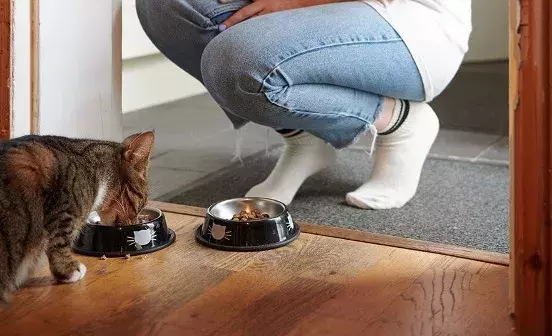Owning a cat is an incredibly rewarding and happy experience, but the cost of owning and keeping a cat healthy and happy is a long-term financial commitment. Take a look at our guide to the one-off, monthly and annual costs associated with getting a new cat.

Cats typically live for around eighteen years, so before getting a cat, it’s important to consider the costs associated with taking care of them for that long. The typical annual cost of a cat is around £1500 per year.
The table below is a guide to the basic costs of cat ownership.
One off expenses
Item |
One off cost |
|---|---|
Cat carrier |
£25 |
Scratch post |
£30 - £50 |
Toys & puzzle feeders |
£40 |
Litter tray |
£10 - £25 |
Grooming tools |
£10 |
Food & water bowls |
£10 - £20 |
Cat flap |
£40 |
Microchip |
£20-£30 |
Cat bed |
£20 |
Total |
£232.50* |
Monthly expenses
Item |
Monthly cost |
|---|---|
Food |
£20 - £55 |
Litter |
£20 - £30 |
Routine health care |
£10 |
Insurance |
£24 |
Total |
£96.50* |
Annual expenses
Item |
Annual cost |
|---|---|
Annual vet check |
£60 |
Pet sitting |
£140 |
Total |
£200 |
The total cost £1590.50* ((monthly cost x 12) + one off costs + annual costs)
*For items with a variable cost, the average has been used to calculate the overall estimated annual expense.
Essential items for a new cat
Before you bring your new cat home, you’ll need to buy a few essential items. These include a cat carrier, bedding, food bowls, a litter tray and scratching post. These will also need replacing from time to time.
A cat flap
Giving your cat access to the outdoors can provide them with a huge amount of positive stimulation. Most cats benefit from having the freedom to come and go as they please especially if they’re young and you’re regularly out. We at Battersea recommend a microchip cat flap. These scan your cat’s microchip and only open for your cat. As well as the flap, you’ll also need to factor in the cost of installation. This will vary depending on where it’s being fitted in your home. For example, installing a cat flap in a double-glazed window will be more expensive than in a wooden door.
Food
Cats need their own food to ensure they get all the nutrients they require. Costs will vary significantly by brand, the size of your cat and their lifestyle (e.g. how active they are) but a typical adult needs two pouches of wet food per day and around 20g of dry.
Litter
Although some cats prefer to go to the toilet outside, we always recommend providing a permanent indoor litter tray. This will need to be scooped out daily to remove any soiled material and a complete wash and change at least once a week. Like food, litters can vary significantly in price.
Routine health costs
Annual vaccination protects your cat against a number of common but serious cat diseases. To keep them free of parasites, you’ll need to treat for fleas and worms regularly, following the advice of your vet.
Insurance
Just like us humans, pets also have accidents and illnesses. Many people choose to insure their cat rather than be faced with large and unexpected costs. We recommend looking for policies which cover your cat for the lifetime of any illness rather than a fixed period of time.
Pet sitting
If you go away, it’s important to make sure your cat will be looked after. In many cases it may be possible to ask a friend or neighbour to help, but for longer breaks, you may require a professional pet sitter.
Microchipping and neutering
If you rehome from Battersea the initial costs of microchipping will be covered. However, there is sometimes a charge if you need to amend your registration details in future. At Battersea we also cover the costs of neutering. However, this is something to bear in mind if you get your cat elsewhere. Prices range from approximately £50 to £100.
C4 is a low-cost neutering scheme which operates in and around London to subsidise the cost of neutering for pet owners. To find out more about the scheme, visit their website.
Cost of living support schemes
Here at Battersea we’re all too aware of how worrying the increasing cost of living is for pet owners. If you’re struggling to afford care for your dog or cat, you’re not alone.
We’ve put together a list of places and schemes that may be able to help if you need some extra support.
Subsided veterinary care
- Blue Cross
- PDSA
- Celia Hammond - 020 8691 2100 (Lewisham) or 020 7474 8811 (Canning Town)
- RSPCA
- Cats Protection
Homeless pets - vet care, fostering, support
- Street Vet
- Dogs on the Streets
- Dogs Trust Hope Project (aid with veterinary costs) - 020 7833 7611
Pet food banks
Download this guidance as a handy advice sheet:
For further advice on the costs associated with pet ownership, visit our Cost of Living Support Hub.



